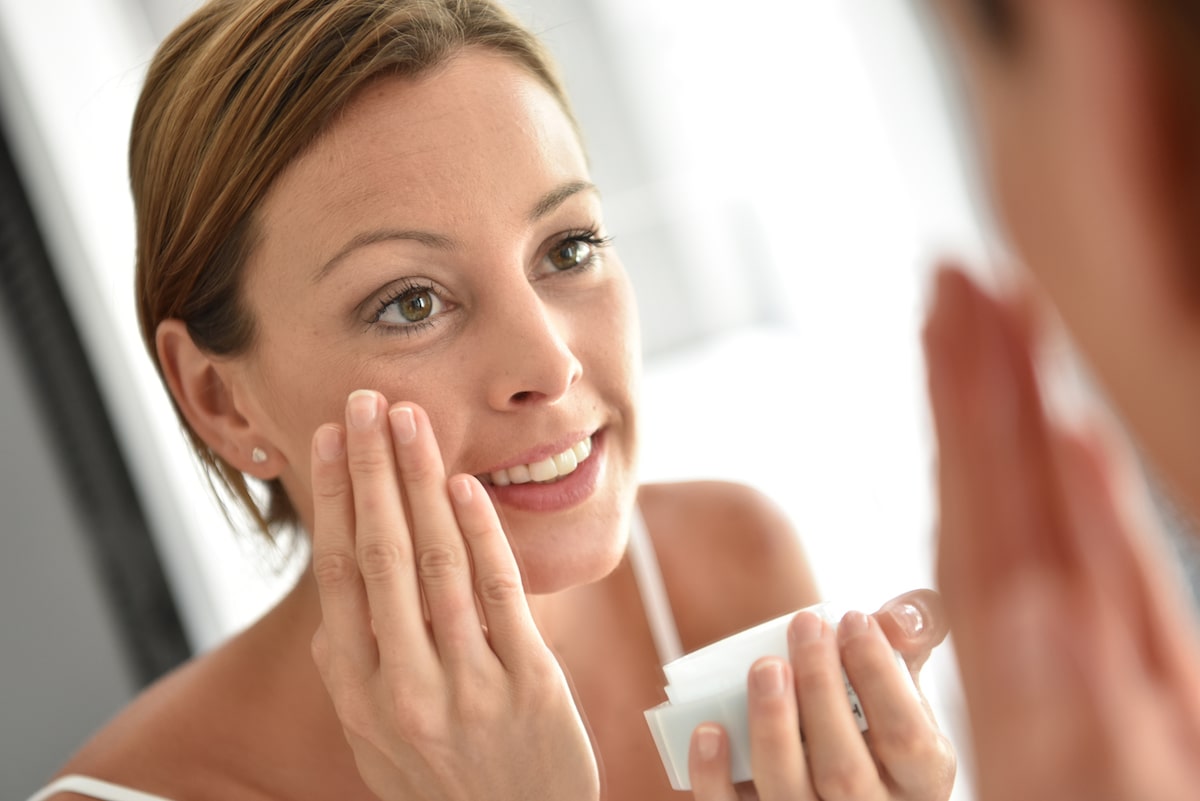No products in the cart.
Anti Aging Products, Blog, Procedures, Skin Care Products, Treatment
Sensitive Skin: 10 Tips For Using Best Anti-Aging Cream
Sensitive skin can be a real pain, especially when it comes to finding the perfect anti-aging cream. You’re likely familiar with the scenario where you come across a product that claims to reverse the signs of aging, but instead, you experience redness, irritation, and acne breakouts.
These tips will help you achieve youthful, radiant, and smooth skin by guiding you in selecting the most effective anti-aging skincare products and providing advice on how to firm the skin to protect it.
Tips For Using Anti-Aging Cream For Sensitive Skin
Anti-aging creams aim to reduce the appearance of age-related issues like fine lines and wrinkles and age spots while also improving skin texture, tone, and overall quality. Here are the best overall tips to brighten the skin, even skin tone, and start protecting your skin:
Know Your Skin Type
Finding out your skin type is an important first step in using anti-aging creams effectively and taking care of your skin. There are four main skin types: oily skin, dry, combination, and sensitive. By comprehending your skin type, you can choose appropriate skin care products and develop a customized skincare routine that meets your specific needs.
Sensitive skin tends to react more strongly to irritants, resulting in redness, itching, and inflammation. When it comes to anti-aging creams designed for sensitive skin, they should be formulated to be mild and non-irritating, containing minimal fragrance and no harsh chemicals. When searching for skincare products, consider those that contain ceramides, as they can aid in fortifying the skin barrier and calming inflammation. It is also advised to visit a healthcare provider or doctor that deals with cosmetic procedures.
Choose The Right And Best Anti-Aging Cream
Choosing a suitable anti-aging cream is an important step in achieving youthful and healthy-looking skin. With so many options available, it can be overwhelming to determine the most appropriate product for your needs.
When searching for many anti-aging creams, focus on those that contain ingredients like retinol, vitamin C, and peptides, which have been proven to effectively reduce the signs of aging. Anti-aging creams come in various formulations, such as creams, serums, and gels. Choose a formulation that works best for your skin texture.
Gentle Cleansing Techniques For Sensitive Skin
If you have sensitive skin, it’s crucial to adopt gentle cleansing techniques to prevent inflammation and irritation. It’s recommended to opt for a cleanser that is specifically designed for sensitive skin and free from harsh ingredients like alcohol, sulfates, and fragrances, to ensure that it’s gentle on your skin. To prevent dryness and irritation, it’s advisable to refrain from using hot water, as it can strip away the skin’s natural oils.
Avoid using harsh scrubs or loofahs, which can be too abrasive for sensitive skin. Instead, use a soft washcloth or cleansing brush to gently exfoliate and remove impurities from the skin. After cleansing, pat your skin dry with a soft towel instead of rubbing it dry, which can cause irritation. Before using a new cleanser or skincare product, do a patch test on a small area of the skin to make sure it does not cause irritation or an allergic reaction.
Apply Anti-Aging Face Moisturizers Properly
Applying anti-aging face cream or wrinkle cream properly is crucial to achieving optimal results, moisture to the skin, and maintaining healthy, youthful-looking skin. Before applying anti-aging cream, make sure your skin is clean and dry. Use a gentle cleanser to remove dirt, oil, and makeup from your skin. Use a pea-sized amount of anti-aging cream for each application.
Using too much cream can cause irritation and may not be absorbed properly by the skin. Apply the anti-aging cream to your face and neck, using upward and outward motions. Avoid the eye area unless the cream is specifically formulated for use around the eyes.
Add Sunscreen To Your Anti-Aging Skin Care Routine
Sun damage is one of the primary causes of premature aging, including the appearance of fine lines and wrinkles, age spots, and uneven skin tone. Use a sunscreen that provides broad-spectrum protection against both UVA and UVB rays. Choose a product with an SPF (sun protection factor) of 30 or higher, and make sure it is water-resistant if you plan to be swimming or sweating.
Apply sunscreen at least 15-30 minutes before you go outside to give it time to absorb into your skin and provide maximum protection. Sun damage can occur even on cloudy days, so it’s important to use sunscreen every day, year-round, regardless of the weather to even out the skin tone. Avoid tanning beds and sunbathing, as these can also cause sun damage, acne-prone skin, and increase your risk of skin cancer.
Avoid Irritants In Your Dry Skin Care Products
Avoiding irritants is important to make your skin look younger, especially for those with sensitive or reactive skin. Irritants can cause redness, inflammation, and other skin reactions that can lead to premature aging and other skin concerns. It’s important to read the anti-aging ingredients on your skincare products carefully to identify potential irritants.
When choosing anti-wrinkle skincare products, be mindful of common irritants like alcohol, fragrances, and harsh detergents, and opt for products that do not contain them, if possible. Before trying a new product, conduct a patch test by applying a small amount to a small area of the skin, such as the inside of your wrist, and wait for 24-48 hours to observe any redness, itching, or other signs of irritation. It’s essential to use exfoliating products with caution and avoid harsh scrubs or abrasive tools to prevent over-exfoliating, which can lead to skin irritation and damage.
Moisturize Before Applying Anti-Aging Cream
Sensitive skin is inclined to dryness, irritation, and flakiness, and using anti-aging cream on dry skin can intensify its susceptibility to irritation and damage. To create a defensive barrier that retains moisture in the skin and inhibits the cream from permeating too deeply into the skin, moisturize before applying anti-aging cream. This helps to reduce the risk of irritation and ensures that the active ingredients in the anti-aging cream are absorbed evenly.
To moisturize before applying anti-aging cream, start by cleansing the skin with a gentle cleanser and patting it dry with a soft towel. Then, take a small amount of moisturizer onto your fingertips and delicately massage it into your skin using circular motions.
Make sure to cover the entire face, including the neck and décolleté. Allow the moisturizer to absorb fully into the skin before you hydrate the skin to apply the anti-aging cream.
Don’t Mix Anti-Aging Products With Other Products
One important tip for using anti-aging cream on dry sensitive skin is to avoid mixing different products. This means not using multiple anti-aging creams or serums at the same time or combining anti-aging products with other types of skincare products, such as acne treatments or exfoliants.
Mixing different products can increase the risk of irritation, allergic reactions, or other adverse effects, especially for those with sensitive skin. This is because different products can contain ingredients that may not work well together or that may interact with each other in ways that can cause harm to the skin. It’s also important to allow products to fully absorb into the skin before applying another product on top.
Keep Skin Hydrated With Hyaluronic Acid Serum Before Applying Retinol
Using a moisturizer that is specially designed for sensitive skin is among the most efficient ways to hydrate your skin. When selecting a moisturizer, avoid harsh chemicals, fragrances, or other irritants, and opt for a gentle formula containing natural ingredients like aloe vera, chamomile, or oat extract, which can provide a calming and moisturizing effect on your skin.
Additionally, refrain from taking hot showers and baths as they can remove natural oils from your skin, leading to dryness and tightness. To maintain your skin’s hydration levels, you can use a facial mist intermittently throughout the day. A facial mist that includes moisturizing ingredients such as hyaluronic acid or glycerin can boost your skin’s moisture levels and make it feel refreshed and revitalized.
Avoid Overuse Of Anti-Aging Night Cream
Overusing anti-aging creams can be problematic for a crucial reason: these products frequently contain active ingredients that aim to stimulate collagen production and accelerate skin cell turnover. However, applying an excessive amount of these products can make the skin hypersensitive, causing irritation and inflammation.
To avoid overuse is to incorporate the use of anti-aging cream gradually into your skincare routine. Start by incorporating the anti-aging product into your skincare routine once or twice a week, and gradually increase usage as your skin becomes more acclimated to it. This will help to reduce the risk of any adverse reactions and ensure that your skin can tolerate the product.
By following these 10 transformative tips, you can begin using anti-aging skincare products to achieve a more even skin tone. Start taking care of skin from environmental damage, knowing that you’ve got the knowledge to make it happen. No more frustration, no more disappointment, just beautiful, glowing skin that will make heads turn. Keep these tips in mind even as you Contact Us and get ready to look and feel your best every single day.








